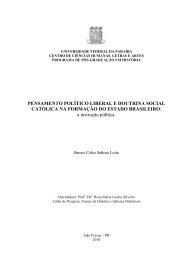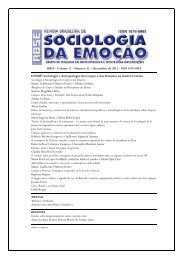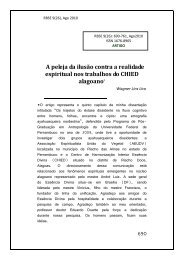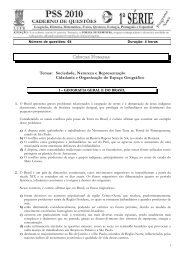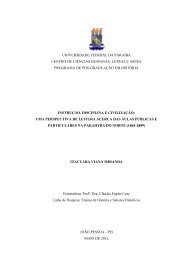abril de 2004 - CCHLA - Universidade Federal da ParaÃba
abril de 2004 - CCHLA - Universidade Federal da ParaÃba
abril de 2004 - CCHLA - Universidade Federal da ParaÃba
Create successful ePaper yourself
Turn your PDF publications into a flip-book with our unique Google optimized e-Paper software.
Generated by Foxit PDF Creator © Foxit Softwarehttp://www.foxitsoftware.com For evaluation only.At this point, there have been over fifteen thousand suchstudies, using one or another of the two hundredstan<strong>da</strong>rdized scales that are available. These scales allhave been shown to be reliable; that is, they repeatedlyget similar results.For this vast amount of labor, what have been theresults? According to twelve reviews of the field, theyhave been trivially small. The average effect size over thelast forty years seems to have been un<strong>de</strong>r 3% of thevariance, and is not increasing. With 97 per cent of thevariance unaccounted for, the field is treading water. Ifthe instruments are not valid, then reliability meansmerely repeating error, like the group that copied thecyclotron.What is the problem? One possibility is that thescales confound a cognitive element with an emotionalone. They repeat an ambiguity in the meaning of theEnglish word self-esteem, casting doubt on the validity ofthe scales.According to dictionaries, the meaning of selfesteemin vernacular usage has both cognitive an<strong>da</strong>ffective components.1.Pri<strong>de</strong> in one’s self; self-respect. (American HeritageDictionary. 2000)2.Holding a good opinion of one's self; self-complacency.(Webster's Revised Unabridged dictionary.1998)3.A feeling of pri<strong>de</strong> in yourself [syn: self-pri<strong>de</strong>] 2: the quality ofbeing worthy of esteem or respect [syn: dignity, self-respect,self-regard] (Princeton University Wordline. 1997)Two of the three <strong>de</strong>finitions (1 and 3) offer a<strong>de</strong>finition in terms of an emotion, pri<strong>de</strong>. Definitions # 1and 3 also suggest other synonyms that, if not emotions,are at least mixtures of feelings and thoughts, withfeelings predominating: respect, regard and esteem.These two <strong>de</strong>finitions stress the affective components ofself-esteem. If we assume that shame is the emotionopposite to pri<strong>de</strong>, then two of the three <strong>de</strong>finitionssuggest that high self-esteem involves pri<strong>de</strong> proneness,and low self-esteem, shame proneness.122



